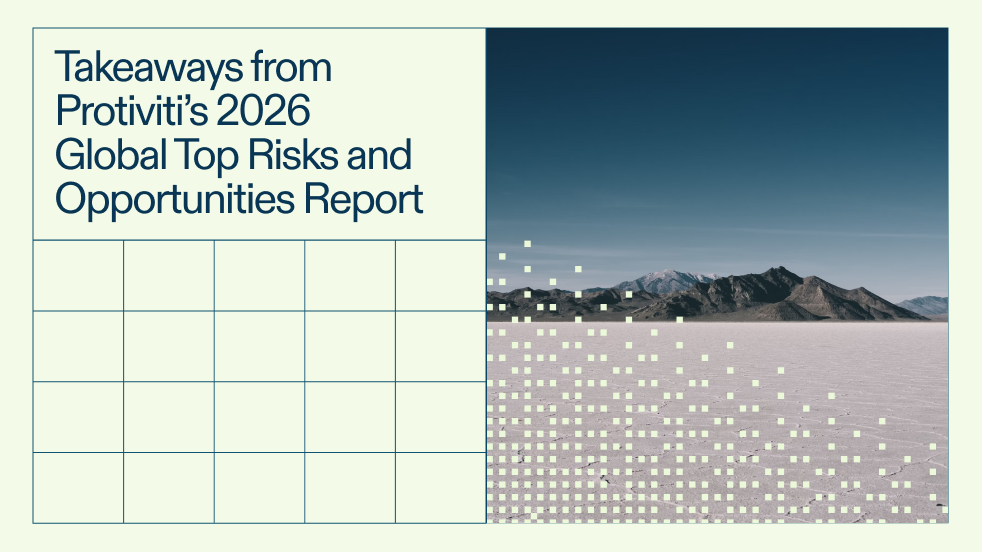
March 31, 2023 • 7 min read
Amanda Pope of InComm Payments Cultivates Relationships of Trust With the Business
Join Richard Chambers for a new episode of his Agents of Change video series, featuring conversations with internal audit leaders from some of the world’s most prominent organizations about innovation in the profession.
In this episode, Richard sits down with Amanda Pope, SVP, Audit and Risk of InComm Payments, to discuss how she’s earned her meaningful seat at the table by investing in relationships with the business and demonstrating the value internal audit can bring, including:
- Playing the long game — change doesn’t need to be immediate to be transformational for the business.
- Knowing her team — prioritizing retaining team members who understand the business and our methodology over forcing a return to the office.
- Seizing opportunities — increased scrutiny on vendors and data providers provides an opportunity for internal audit to step up to help streamline assurance functions.
Watch the full conversation, and read the can’t-miss highlights below.
Change Doesn’t Need to Be Immediate to Be Transformational
Richard Chambers: Amanda, in my book, “Agents of Change”, I take the position that internal auditors should seek to drive change in their organizations. I define agents of change in the profession as those internal auditors who are catalysts for transformation that creates value within the organizations they serve. What is your view on internal auditors as agents of change? Is that how you would define change agents in our profession?
“Amanda Pope: I think it is a great way to describe internal auditors. I do think sometimes we need to take a step back though to say, we are transforming and we are making change. Even if it’s not immediate, even if it takes years, you’re level of change and your movement with change has to depend on the company culture and how you can help move change along while still being within the bounds of that culture.”
Richard Chambers: Right — I think I define change more in terms of outcomes than outputs. Some internal auditors who don’t see immediate change get frustrated. But really, as you say, it should be a longer-term view that you’re helping the organization to evolve and to improve.
“Amanda Pope: Absolutely, and also understanding, you may not always get the credit for the change, but you know, deep inside, that you were the one helping drive those conversations and helping management reach those conclusions, even if it’s their idea — and that’s fine too!”
Building Trust in the Value Internal Audit Can Bring
Richard Chambers: In those organizations you’ve served at, did your board members and executive management embrace the idea of internal auditors as change agents? Do you find that they value assurance or advice more?
“Amanda Pope: I would say every board has valued internal audit. I think the level of value put on internal audit varies, again, depending on culture and sometimes you’re trying to stake your claim in saying we are new to this company, but we will add value — and we do add value. So that has been a little bit of a stretch in some organizations, trying to get the board to receive that.”
Richard Chambers: Yeah, having been a CAE myself over the course of my career with many different organizations, I know how challenging it can be when you get a new audit committee chair, a new CEO, and maybe they come in and they’ve got a different view of internal audit than your last one did. You’ve kind of got your work cut out for you to orient them and help them to appreciate what you can do.
“Amanda Pope: Right and establish just the trust also. Trust us in what we’re doing. We know what we’re doing and it will result in something at the end — hopefully something good and of value.”
A Seat at the Table Means Being Part of Long-Term Planning Conversations
Richard Chambers: The past three years have been an incredibly disruptive period for the world in general, and business and government organizations in particular. How have you ensured that your internal audit function has stayed abreast of the risks that face your organization?
“Amanda Pope: One is making sure we’ve maintained our seat at the table and I know a lot of people say that, but really if you’re not in those conversations where they’re talking strategically about what are our plans for the business going forward— what do we want to do in the future, what is our long-term plan — you’re not able to really understand how different environmental conditions could negatively impact your business and those plans.”
Richard Chambers: Right, let me ask you a question. So, a seat at the table is so important. In my book, “Trusted Advisors”, I talk a lot about that trusted advisors are always invited to the table but working remotely as we all have been, as many have been in anyway for the last couple of years, you think it’s been harder to maintain that seat at the table or at least harder to leverage it for all the right outcomes?
“Amanda Pope: That’s a great question. I personally have not felt that it’s been more difficult, but I think that also is a testament to my relationship with our executives and the relationship that I have with those who are making those decisions. They’re actually calling me instead of me having to force myself into the conversation. Also, being remote makes it a bit more serious and important to make sure you’re having those touch points with executives or senior management every so often, so that they don’t forget about you.”
Retaining Talent by Empowering Auditors and Leaning in to Remote Work
Richard Chambers: You know, Amanda, one of the top challenges CAEs are facing in 2023 is recruiting and retaining talent. Is that a challenge that you’ve had to deal with? And if so, what strategies have you relied on to recruit and retain the best?
“Amanda Pope: Besides just sending positive vibes into the universe, I would say maintaining and retaining our talent has really been focused on making sure that our team members are empowered to do their jobs, that they know that they’re trusted, and also just keeping those touch points more consistent and more deliberate. As far as attracting new talent, I feel pretty blessed that I haven’t had to do much recruiting in the past couple of years since Covid, so I can’t speak to that very much. Our team is, I would say, 95% remote. We go into the office to meet up in person and to make sure that we’re maintaining our team consensus and our team feel.”
Richard Chambers: Really good chief audit executives realize the world has changed, the desires of their team have changed, the mechanics of the workplace have changed and they’re able to adapt to it, I think.
“Amanda Pope: Even retaining our talent, I know that if I forced my team to come back into the office, I would lose a lot of my top talent. It’s much more important to me toretain the people that understand our business and our methodology than it is to force everyone into the office.”
Internal Audit Lives in a Glass House — Lead By Example
Richard Chambers: Before internal auditors can be credible change agents, I believe they have to be able to walk the talk, that is, be change agents within internal audit itself. Do you agree with that? And what initiatives as a CAE have you undertaken to transform the internal audit function at InComm?
“Amanda Pope: Absolutely, I agree with that. I always say that internal audit lives in a glass house. We have to follow the company’s policies and procedures. Whatever else we’re expecting of our audit customers or clients, we have to do the same thing. We have to be the examples.”
Richard Chambers: Right, I think that’s another good strategy, and I think that what it takes in this day and age to be able to keep connected with executives and management is for them to know that we appreciate and understand the challenges they face.
Flexibility Undergirds the Characteristics of a Change Agent
Richard Chambers: The research that we did, as we were getting ready to write “Agents of Change” identified four overarching characteristics of change agents: business acumen, a strategic mindset, relationship-centric, and innovative. Do you agree with that list? Is there something that you think we missed?
“Amanda Pope: I think those four capture it because when I hear change agent, I also think of flexibility. I think that’s very much captured in each of those pillars because if you’re not flexible, you aren’t going to build great relationships, you’re not going to be able to learn people’s personality styles. Innovation requires flexibility because you have to be open to change to innovate. So I do believe those four pillars are very well defined.”
With Increased Scrutiny on Vendors and Data Providers, Internal Audit Can Step Up to Help Streamline Assurance Functions
Richard Chambers: Finally, let me ask you this. I get asked all the time, what do I think the future of internal audit holds? And I’m not a fortune teller, I don’t have a crystal ball, but I do have some thoughts about what the next decade might have for internal audit. Let me ask you, if I ask you to pull out your crystal ball, what do you think the biggest challenge and the biggest opportunity for internal audit will be over these next 10 years?
“Amanda Pope: Well, I know every business is very different, but in our business we’re a service provider and we rely on a lot of vendors as well. With the changes in the economy and the changes in the political and physical environment, we also are experiencing more scrutiny on vendors, and those with data especially. What I hope internal audit will be able to do in the future is streamline some of the second and third lines of defense to make it easier for corporations and businesses to manage all of their requirements and expectations, not just from regulators, but also from our business partners.”
Check out more audit leader interviews with Richard Chambers on our Agents of Change video series channel.
You may also like to read


Latest data on AI adoption reinforces need for internal auditors’ “superpowers”

5 internal audit resolutions for 2026

Audit reporting best practices: Guide for audit leaders

Latest data on AI adoption reinforces need for internal auditors’ “superpowers”

5 internal audit resolutions for 2026
Discover why industry leaders choose AuditBoard
SCHEDULE A DEMO



